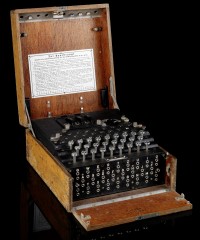There are few people in America, perhaps around the industrialized world, who haven’t at least heard of the “Wind Talkers” story. There are perhaps fewer still who believe everything from World War II has been declassified. We are now entering an era where we hear about the tiniest things which had the most dramatic impact on the war. Yes, there has been much ado about the invention and deployment of nuclear weapons recently, but the Navajo Indians who became Wind Talkers arguably saved more lives than either bomb did.
Technology keeps pushing things, especially communications, forward, and it leaves in its wake some things which shouldn’t be forgotten. Scientists use the dead Latin language to name things not just to be elitists as many claim, but because the language has ceased evolution. One thousand years from now the Latin name of something will not only be the same but will have the same meaning. This is a point of security. Some will claim stability but it is the stability which provides security. No currently used language can provide such stability. You think English should be a candidate? Consider the word “rubber.” If you clicked on the link you saw a lot of definitions and more will come with time. One that was missing was the U.K. English term for pencil eraser.
Efficiency breeds loss and ingenuity. The American space program spent around a million dollars inventing a pen which writes upside down, the Russians just used a pencil. The typewriter was invented (with competing keyboard layouts) but the people who were running businesses didn’t know how to use them so they created secretarial positions. They wanted to quickly dictate letters and get them in the mail so hundreds, perhaps thousands of companies came up with competing shorthand methods and texts. Eventually Gregg became the one taught in nearly every American school because we needed a standard. Shorthand allowed a secretary to quickly take dictation then translate and type it up later. Someone who wrote shorthand regularly could write north of 200 WPM (words per minute.) Even with today’s soft touch keyboards few can power through and achieve that kind of WPM.
Eventually technology sought to push out a publishing/education niche and it created various versions of the dictation machine. Originally these things were vary expensive. Some companies which already had typing pools connected a centralized dictation system up to their internal phone system so people could phone in work for the typing pool. You can probably still find dictation machines using those trendy micro-cassettes, but most have went digital these days. There are even dictation apps for your identity theft enabling device (smart phone.)
Despite our always connected always typing culture, dictation still plays a big role. While I don’t know of any major corporation with a typing pool, I do know of a great many people who still carry around a dictation machine to make mental notes for themselves as they are walking/driving. Thinking and speaking is still both easier and safer than thinking and typing, especially when behind the wheel.
We are now at a point in time where typewriters are a rarity. Most large companies have one or two stuck in a corner somewhere for those days when the printer won’t feed envelops, but by and large they are novelties few workers know how to run. Oh, most know how to type, they just don’t know how to feed the envelop, erase a mistake or change the ribbon. How many of you reading this have ever owned a typewriter eraser with the plastic brush at the end? You can’t use that liquid correction fluid on an envelop because it will flake off in the mail. The dry stuff might stay, but safest bet is to erase the mistake or start over. If you don’t have the eraser, then starting over is the only option. Yes, most electric typewriters had a correction ribbon but you don’t know how to change that and everybody else used up the one which is in there.
Most of you have heard of the Enigma Machine. It was a method of encoding messages so they could be freely broadcast over radio. The specifics of the rotating keys and how it worked don’t matter now. The fact remains that once one of the devices was captured the Allies were eventually able to crack the code. Enigma suffered from mechanical speed and translation issues as well. A radio operator had to write it down then someone else had to translate it with the machine using the correct key. While it was a tough nut to crack, if the Germans wanted to change out the keys they had to get every sub/ship/unit with one of these to bring it in for service.
We changed the Wind Talker code repeatedly, perhaps with each new class that came through the training. They got deployed out and the previous group came back, perhaps to go through another class and create another version. The Wind Talkers spoke and thought in the code when transmitting. There was also the added benefit of almost all of them knowing each other’s voice and how they spoke the code.
Today we are at the cusp of another technology purge. There is a large push to purge handwriting from basic education and just start kids as young as first grade at a keyboard. Most kids are growing up around tech so it is an understandable desire. Give them an $80 or less device and load all of their books on it. The days of the book bag and back pack seem doomed. Culturally we still have not purged the need for a signature though. While you may well get direct deposit and find a way to pay every bill on-line, you still need to sign a credit card receipt, mortgage and employment contract.
Even if you know nothing about technology you should have figured out that computer systems running on cheap commodity hardware using cheap/free operating systems can never be made reliable or secure. If all of the rampant identity theft data breaches in the news didn’t teach you that, the DNC hack should have. (Personally I’m still waiting for both a FaceBook and Google data breach of biblical proportions. You know it _has_ to be coming, especially after Yahoo. The crooks are just working their way up the bottom feeder food chain.) Neither business nor industry leaders will ever admit their fault in the situation. That whole “cut costs for a fast buck” mentality is what got us here, of that there can be no question.
The government and military will continue spending billions on encryption and other transmission security methods, but should they? Maybe it is time to use a pencil?
During the time when every high school taught shorthand there were hundreds, perhaps thousands of competing shorthand styles. Here is a lovely page which talked about the history of Gregg and explained how two people who learned at different times or for different industries couldn’t reach each other’s shorthand. Business shorthand was different than court reporter shorthand than . . . Every few years a new shorthand dictionary was published consisting of simple or limited strokes which could be used to replace entire words.
One version of the Gregg Shorthand Dictionary is said to have contained 19,000 words. How anyone could keep all of those squiggles straight in their head is beyond me. Hopefully you will click that link and look at it. Not just look but read down through at least page 5. Can you imagine just how phenomenal your penmanship had to be to handle all of the subtle differences? Take a look at “adequate” and “adequately” or “admonish” and “admonition.” Heck I can’t even read my own handwriting!
Memories of high school are a bit foggy now, especially the shorthand because, like a fool, I never used it to take notes in college, which was one of the reasons I bothered learning it. I “think” we had to know 500 words, perhaps less. I know we had to handle all of those -tions and -ives and have enough to sound out the words we didn’t have simple squiggles for. Now that I think of it, 500 seems too high. We only had to type 35 WPM to pass the class. Perhaps it was only 100 words plus all of the major sounds?
At any rate, in most of its incarnations shorthand is a dead set of languages. You will find self-taught people with their own personal dictionaries (usually reporters who do off-camera interviews) and that is about it. Thankfully one of the original Gregg books is on-line in PDF form for those who wish to learn it.
Consider the dictionary of 19,000 words though. Once you teach a class/group to write passable ordinary shorthand you can simply have them learn a few thousand special symbols for words. These words may or may not have some kind of additional Wind Talker type translation. Once written on a piece of paper though, the image can simply be sent, unsecured, via text, email or even posted on a blog. First someone needs to know shorthand. Not just any shorthand, but the style of shorthand you chose (don’t forget there were, by some counts, over 1,000 “official” shorthand styles/methods before Gregg won the classroom. Just find one of those text books, which isn’t available anywhere on-line, at a garage sale or book scrapper and you are already really secure. ) Next they need to know the current dictionary, which only exists on paper in the classroom in the middle of nowhere America.
That’s it. No high tech required, just dead tech re-deployed.








